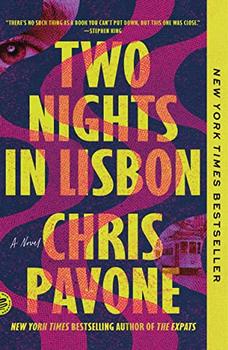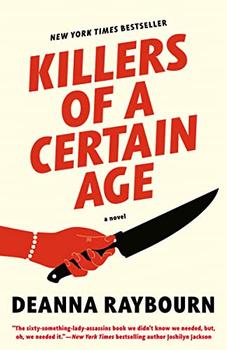Summary | Excerpt | Reading Guide | Reviews | Beyond the book | Read-Alikes | Genres & Themes | Author Bio

A Novel
by Chris PavoneAt first glance, Chris Pavone's Two Nights in Lisbon appears to be yet another of a particular type of underdog story: Protagonist is threatened, overcomes seemingly insurmountable obstacles and emerges as a heroine one hopes will be victorious. However, what makes the novel stand out is its unique overlay of that tired trope — "woman seeking justice" — onto an intriguing and often disturbing exploration of why people thirst for power. What begins as a simple kidnapping story quickly deepens into an insightful analysis of the nature of truth and the lengths to which one may go to ensure that justice is served.
In the opening scene, we are shot into the thick of a summer vacation in Lisbon, Portugal, where Ariel Pryce and her mysterious younger husband, John, are extending one of his many business trips with some personal sightseeing and pleasure. It's a late honeymoon of sorts, since they are newly wed and still getting to know each other. As a couple, they appear to be glamorous, carefree and prepared to have a wonderful time. Yet Ariel's character reveals hints of a frenetic past when she discovers John is missing, and finds the Lisbon police have no intention of sending out a search party until absolutely necessary. Stranded in a foreign country, with no allies in sight, she experiences sudden, sharp mood swings, questioning every choice she makes. A former actress, she dips back and forth between her real self and the self she (possibly along with others) has created for reasons that become more apparent as the novel progresses.
Continuing this theme of splintered reality, Pavone thrusts the reader into a malleable timeframe where one is unsure of what is real and what is fabricated. Flashbacks and delineations of time in each chapter ("Day 1. 8:58 A.M.") create a sense of disoriented fervor, much like that undergone by the central character from the disappearance of her husband until the story's palpitating conclusion.
Despite the questions surrounding Ariel's motivation (Does she really care about John? Is she really who she says she is?), Pavone reassures the reader she is someone to root for. Her private musings, interspersed in first-person passages throughout the action, reveal a troubling pattern in which she has not been trusted, with dire consequences. Within these confessional nuggets, she constantly asserts to the reader that she is not a hysterical person (see Beyond the Book). Paradoxically, this triggers a warning that she might not be the most reliable of witnesses. (Almost comically, this type of irony emerges again during a scene where she's being questioned by the CIA. Every time she says the word "honestly," she realizes the use of this word just discredits her further in the eyes of the investigators.) Yet we sense there is truth beneath her story as she states, "Sometimes what looks like panic is really rational self-preservation." We wonder who exactly Ariel is, this woman who not only knows how to "repair a leaky faucet...reignite a pilot light...and paint a patch of drywall" but how to "kill someone, using nothing but her bare hands." Pavone drops these scintillating breadcrumbs of information about the character at the end of chapters with calculated intent, enticing us to read further.
Also effective is Pavone's insight into how labeling women's stories as "hysterical" can conveniently absolve perpetrators of their crimes. Condescension pervades the Lisbon police force, the American Embassy and the CIA. The story loops back in time to an American police officer from long ago who also refused to accept Ariel's story as truth. As more and more authority figures (both male and female) fail to believe in her assertion that her husband is in danger, she is forced to turn her perceived "hysteria" on its head, using it to gain the only kind of leverage that works with these agencies of power. Her past career as an actress comes into full effect here, and we eventually discover she has some cards up her sleeve, including secrets involving John.
As a male author, Pavone's sensitivity to Ariel's plight and those of women like her is remarkable. His forays into her psyche allow you to directly experience her past and present with bright, painful clarity. By employing the technique of second-person narration brilliantly ("You want to believe that there's only one reality, that we all share it...but then you're told something different"), Pavone shows Ariel not only chastising the immediate figures who refuse to believe her, but pointing out that the very institutions meant to protect the powerless so often fail, a theme that is reinforced throughout this poignant novel.
If you're a fan of mysteries and thrillers, and searching for one with many psychological twists and turns, Two Nights in Lisbon is for you. Much like Rebecca Starford's An Unlikely Spy or Julie Clark's The Lies I Tell, it will leave you pondering what has just happened, and eager to reach for it again.
![]() This review was originally published in The BookBrowse Review in July 2022, and has been updated for the
June 2023 edition.
Click here to go to this issue.
This review was originally published in The BookBrowse Review in July 2022, and has been updated for the
June 2023 edition.
Click here to go to this issue.

If you liked Two Nights in Lisbon, try these:

by Suzie Miller
Published 2025
Based on the Olivier and Tony Award-winning play, Suzie Miller's Prima Facie is an unforgettable story of what happens when a victim is asked to navigate a system that is not set up to accommodate the lived experience of sexual assault survivors.

by Deanna Raybourn
Published 2023
They've spent their lives as the deadliest assassins in a clandestine international organization, but now that they're sixty years old, four women friends can't just retire – it's kill or be killed in this action-packed thriller by New York Times bestselling and Edgar Award-nominated author Deanna Raybourn.




Poetry is like fish: if it's fresh, it's good; if it's stale, it's bad; and if you're not certain, try it on the ...
Click Here to find out who said this, as well as discovering other famous literary quotes!
Your guide toexceptional books
BookBrowse seeks out and recommends the best in contemporary fiction and nonfiction—books that not only engage and entertain but also deepen our understanding of ourselves and the world around us.